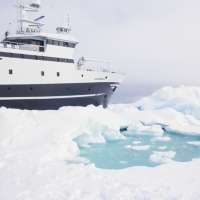Arctic study finds CO2 helps plants grow but only at low temperatures

A new international study involving researchers from The University of Western Australia has found that carbon dioxide (CO2) has a positive effect on producing organic material at low temperatures in the Arctic Ocean, but that this effect disappears once temperatures increase.
The research, published in Nature Climate Change, is expected to help improve predictions about the future impact of climate change. Phytoplankton are the first link in the food chain and are known as primary producers because they produce the first forms of food.
Ms Lara Garcia-Corral, Research Associate at UWA's Oceans Institute and School of Plant Biology, said CO2 regulated the production of organic matter by marine phytoplankton, but the study discovered that the fertilising effect of CO2 was only noticeable while temperatures were low.
"In spring, when temperatures are still low and enough nutrients are available in the water column, phytoplankton are more likely to mitigate the consequences of climate change, acting as if they were a big forest," Ms Garcia-Corral said.
Led by researchers from the Spanish National Research Council (CSIC), the team compared laboratory experiments with in situ samples along a natural gradient of CO2 taken from several cruises in the Arctic Ocean.
"The micro-organisms that form the phytoplankton community are the base of the food chain and account for 50 per cent of the annual primary production of the planet," Ms Garcia-Corral said. "Like plants and trees they capture carbon dioxide to grow and produce oxygen through photosynthesis."
She said scientists had found that the ice cover of the Arctic had shrunk by almost half in the past two decades, which had generated an increased inflow of carbon dioxide of man-made origin into the ocean.
"This influx of CO2 could benefit primary producers, but we cannot forget that the temperature of the Arctic Ocean is also increasing almost three times faster than global temperatures," Ms Garcia-Corral said.
"With the advent of the summer, when the temperature increases, the fertilising effect of carbon dioxide diminishes to nothing and the ability of phytoplankton to capture CO2 decreases," she said.
"These changes have a significant impact on ecosystems and the regulation of CO2. Therefore, they are fundamental to elaborate projections of future impacts of climate change."
More information: "Temperature dependence of CO2-enhanced primary production in the European Arctic Ocean." Nature Climate Change (2015) DOI: 10.1038/nclimate2768
Journal information: Nature Climate Change
Provided by University of Western Australia



















